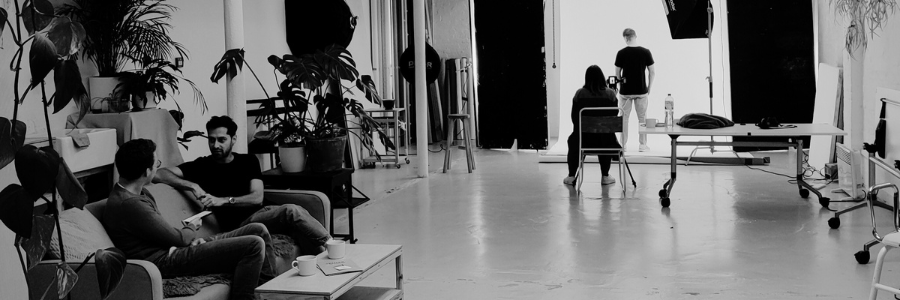It's a great time to be a short man in the entertainment industry. From Zac Efron to Kevin Hart to Tom Holland to Bruno Mars, the worlds of music, comedy, and acting are now well stocked with shorter guys. But what about modelling? How do short men get into the business? And is it even possible?
Let's be honest. Some of these roles will be harder than others. Runway models, for instance, need to be uniform in height (and that usually means over 6 foot). But there's still plenty of opportunities for shorter guys, and our model Vlad is living proof of that.
Vlad is 5'7 and a successful model and actor. I spoke to him about his career, and about any advice he'd give to aspiring models under 5'10.

Interview with Vlad - Can Short Guys be Models?
Jack: Great to meet you Vlad. First off, how did you become a model?
Vlad: To be very honest with you, I started to take advantage of every possible skill that I have and I've noticed that London is a good market for anyone. I started my career as an actor and a dancer. And one friend of mine, basically, she introduced me to this kind of new field of work, which is modelling and fitting modelling as well, where you don't have to fit any certain criteria in terms of height, measurements.
I guess at the beginning, most of the people, they just associate the idea of modelling with catwalk, and you need to have a certain type of body, certain structure, a certain height. So for me it was quite surprising that I started to do a lot of modelling jobs, or fitting modelling jobs without having the stats of a catwalk model.
Jack: Can you explain what a fitting model is?
Vlad: So basically, companies and brands, before they create a collection - or even after they created the prototypes of the collection - they need fitting models. That means those people are like pretty much everyday people who wear any possible size that you could buy in a shop. They try their prototypes on, so it's very good feedback that brands get from the fitting models in terms of how the clothes look, and how they feel based on the whole range of sizes.
Jack: So it's in the product development phase basically.
Vlad: Yeah it is in product development. And sometimes there are collections that are already on the market so they just get feedback in case they want to produce the same type of collection again to know what kind of adjustments they need to do.
Jack: And what sort of brands have you modelled for in the past?
Vlad: I model for a brand called Goldwin, It's a Japanese brand, they do lot of high -tech type of jackets, very waterproofy and a lot of technical equipment. I did the fitting modelling for Urban Outfitters.
Jack: And have you encountered any sort of difficulties, especially being a shorter model?
Vlad: To be honest, from my side, whatever job is happening, whatever opportunity comes to me I'm just happy and grateful. No matter how many there are or how often they are. I know I might not work as much as other people do, but I'm fine and I am grateful for whatever it is, and I'm happy that there is still a market for this. There is so much.
And I'm sure that even for more standard models it's very, very high competition because there are so many people out there. Whereas for us, maybe it's way less because shorter guys, they just don't even try to do as much work within the modelling industry or fitting industry so I guess at the end it kind of balances out.
Jack: That's a great way of looking at it.
Vlad: Yeah exactly. It can be an advantage sometimes to find a niche.

Jack: More generally, what advice would you give to shorter guys to improve their style?
Vlad: You know for a while I was afraid of certain type of clothes because I was just believing they're not gonna fit me. For example I wouldn't wear like a long coat or I wouldn't wear a long jacket. I had it in my mind that certain items are just designed for taller people.
And I just, you know, managed to fight these kind of ideas, and I feel like I feel comfortable and confident enough to wear anything. So I think no matter how tall or how short you are, it's about the level of confidence. It's really, really, really important. And I really advise people to wear whatever they feel is comfortable. Obviously, there should be some parameters, like you still should look good, but just like there to try and just express yourself.
Jack: So that's a good example, actually, the long coat. What would be your approach? Because obviously you don't need to go past your knees. What do you do? Is it just trying lots of different types on?
Vlad: At the moment, I just try whatever... What I feel now is like I moved on from the fear of just trying some items on me. And now at least I give myself a chance to try some items that I was staying away from and really look at myself in front of the mirror and give myself a chance to like the item or not. Things where I was not, you know, brave enough in the past.
Jack: You talked a little bit about how you got into modelling, but how specifically did you find an agency to represent you?
Vlad: Google.
Jack: You just Googled it?
Vlad: Yeah, in my case, it started with this friend of mine who was working already for this agency. So she kind of explained to me, just explained to me the fitting modelling industry because I had no clue. So initially, I just texted this agency and then on Google, I started to write to other agents and other fitting model agencies, for example. And I started to email them.
Funnily enough, actually, yesterday, another fitting agency just texted me saying, "Hey, you came for a casting some while ago, I think it's more than a year now, or maybe it's more than two years, and you were quite short at that time for us, but hey, guess what, now we need somebody who's fitting your brief." So potentially this week I'm gonna have a two -day job, I don't know exactly for which brand, but that shows that the market is changing and the possibilities for people who are, you know, short are kind of growing and growing.
That's one thing with fitting. Then with other modelling, now things have changed even more. I work with a lot of modelling agencies, who are my agents, and they represent me especially for the commercial side, because now the industry is really, really open to everyone.
Jack: And in terms of getting into an agency? How do you apply to them?
Vlad: You just need some photos, some quality ones. I mean, in my case, if I want to be represented for the commercial side of the agency, not for the catwalk, obviously having some experience with acting, either studying or working already, of course it's a plus.
But I'm not sure it's mandatory. And when it comes to approaching this, yes, it's a CV if you have something to show to prove, either it's modelling experience or acting experience or any sort of experience. Can be dancing as well.
And of course headshots. It's an important thing. Full-length pictures are another important thing and I know modelling agencies care a lot about what is called Polaroids. Polaroids are this very basic photo with as little touch-up on the editing as possible, just to show them how you actually look.
But if you have more and you can mix them, that's even better, yeah. And of course you need to know your measurements as well. Knowing your measurements, that's really important.
Jack: Last question, if you were a shorter guy wanting to get into modelling, what sort of one or two pieces of advice would you give them, what would be the key things to focus on?
Vlad: Well first of all to believe that there is a market for everyone. My other advice is to do a lot of research, whether on Google or social media, regarding agents that would like to represent you. Obviously, if you want to get into this, probably at the beginning many people are going to be happy to be represented by any sort of agent, obviously.
It's maybe harder to aim at the bigger agencies, but you never know. Make an effort, maybe save some money, pay your photographer. If you're not from the industry, just get yourself proper pictures, headshots, full-length photos.
Of course, you can mix them with everyday photos that you can do with your phone. Show your style in the pictures as well, and just go for it. Send emails and have a lot of patience and be prepared for a lot of rejection, because this is a big part of the industry.
Don't ever take things personally, because if you're willing to work within this industry - modelling, acting, dance, whatever performing industry - rejection is an everyday thing that you're going to encounter with.
You have to be persistent enough and brave enough. Obviously, this will happen in time. I wasn't dealing very well with rejection at the beginning, but then somehow I developed this mental strength that now things don't move me.
Sometimes people focus on the tip of the iceberg, but behind that, there are 90% of the jobs that I don't get. Of course, I'm excited about the ones that I get, but behind closed doors, there are so many other auditions that you have to go through.
There are so many castings that you just don't get, or emails that people never reply to, whether it's an agent or whatever. You just have to be ready for this. If you really want to pursue this, even if it's a career, even if it's a side activity, just don't take things personally.
Jack: That's brilliant, Vlad. Thanks very much.
You can see more of Vlad's work on Instagram.

